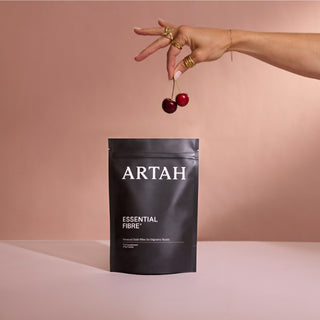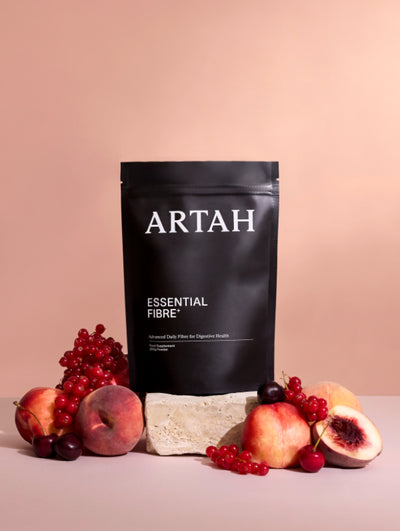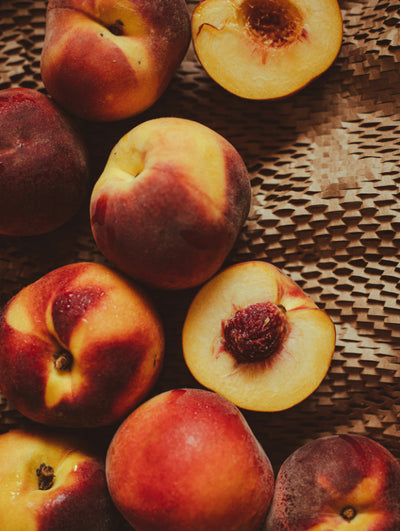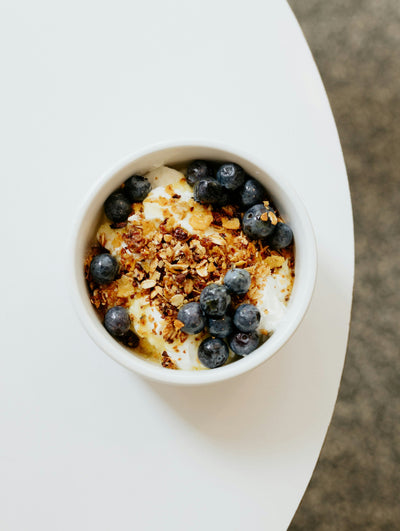As a practitioner, helping people navigate their metabolism as it morphs throughout different life stages and in response to lifestyle changes is a core part of what I do. Earlier this month it was my birthday, and I’m proud to say that I’m officially in my 40s. I’ve also had 2 babies in the last 3 years, so it’s no surprise that my metabolism has drastically changed. Here's what I know now.
I need to modify my routine based on my sleep patterns.
Hands down, the number one challenge for me recently has been sleep. At 15 months, Lola has just started sleeping through the night until 5am, so between her and Maisie, it’s been three long years of too little sleep. Here’s what we know – as little as a few days of poor sleep can increase insulin resistance, create glucose intolerance, and increase ghrelin (our hunger hormone). It also creates an imbalance in our HPA axis, triggering excess cortisol, which further affects digestion, mood, metabolism and hunger. Whilst I’ve definitely felt this in my body, this period of sleep deprivation has reinforced the profound power that food has on how I feel. There are some issues that I can safely say I treat solely with supplements, but the number one lever I use to combat the effects of poor sleep is nutrition (number two, is of course, Cellular Hydration). Here’s what I do to help.
- I’ve increased my protein intake dramatically; on most days, I try to get about 1.5g per kg of body weight.
- I’ve streamlined my grains; when I’m overtired, I just don’t feel as balanced when I eat most grains. I stick to rice, which is the grain that suits me best.
- I’ve reduced my IF. A few years ago, I would use IF 3 days per week. Now, I stick to once per week, with the exception of my ovulation time, when I do a little more (more on this below).
- I’m super diligent about avoiding sugar and sweeteners. I have to admit, this is one area that has made a world of difference for me. It’s not that my diet was previously high in sugar, but it wouldn’t be uncommon for me to have energy balls, sweetened protein shakes, or the odd ‘healthy’ treat (hello vegan brownies). But now, combined with lack of sleep, sugary things just aren’t worth it for me; they do nothing for my appetite, alter my mood and just generally make me hungrier. When I want something sweet, I make it myself (with more natural ingredients).
- I’ve reduced my coffee (sigh). I. Love. Coffee. But, I have become more caffeine sensitive over the last few years, so whilst an extra cup when I’m overtired feels good in the moment, I feel strung out quickly afterwards. I’ve replaced my extra cup(s) with matcha, which has energising phytochemicals that also help balance appetite and cravings, and when I really need it, a nice shot of Energy Fix.
- I avoid high intensity workouts early in the morning. It’s too much stress on my body when I’m sleep deprived. Instead, I’ll do something low intensity or workout later in the day.
So how do you know what will suit you? It’s important to be patient, because it takes time to work it out. Some foods will give you an obvious reaction, like bloating or a headache, whilst others have a more subtle effect, like rebound low blood sugar or agitation, which may show up a few hours later. Likewise, some workouts may feel great in the moment, but leave you feeling completely depleted by noon. Just start to observe, and then it’s trial and error from there.
I do better on probiotics.
A few years ago, I listened to a podcast on the effects of childhood antibiotic use on future health and risk of chronic disease. It stated that kids, on average, will experience 18+ courses of antibiotics by the time they reach their 16th birthday. This statistic shocked me, even though it’s well known that antibiotics are overprescribed (although thankfully this is starting to change). But what shocked me even more was my own history with antibiotics. When I reflect on my childhood, between ear infections, sinus infections and strep throat, my annual antibiotic use was around 3 courses from the age of 2, which didn’t slow down until I was 18. If you’ve already done the math - I know. Just shy of 50 courses of antibiotics is staggering, but unfortunately, not uncommon. Throw in the fact that I’m from a caesarean birth, and I’m not sure my adult gut ever stood a chance. I don’t suffer from digestive issues, mainly because I eat well and I’ve learned what foods suit me best, but I would class both my metabolism and immune system as sensitive. Because of this, I’ve been obsessed with the microbiome and the profound effect it has on all things health – from nutrient absorption, detoxification, energy, and immunity, to cravings, cognitive function and overall mood. So, what does this all mean for me? I’ve found that I just do better when I proactively focus on gut health; I do this by supporting my gut with probiotics and regularly consuming fermented foods.
My alcohol tolerance has changed.
Our bodies become less efficient at metabolising alcohol with age, but there are other factors that will make or break our ability to deal with a hangover too. Partly from age, partly from stress and partly the chronic sleep deprivation from being a mom of two under 3; I just can’t enjoy alcohol like I used to. I’ve never been one of those people who can spring out of bed the next day after a night of red wine (probably because of said microbiome issues), but this has definitely worsened since hitting 40. It has the biggest impact on my mood; quite frankly, I feel unhinged, and not just for one day... for many, many days (probably because it’s coupled with lack of sleep). So whilst I rarely drink at the moment, and probably won’t until I can get into better sleeping patterns, when I do drink (I still love an icy margarita) I arm myself with Deep Detox the night before and Cellular Hydration the day after. It doesn’t make it perfect, but it drastically improves my ability to detoxify, rehydrate and recover.
I’ve hacked my cycle and it’s transformed my energy.
It’s not all bad after 40 (!), and the thing that’s improved the most is my cycle. Cycle synching is all the rage, but supporting how an individual experiences the ebs and flows of their hormones has always been a core part of naturopathic medicine. I started to focus on it in my early 30s because of bad PMS and painful cramping; now, my experience is like night and day, and it’s continued to improve from following my biology rather than fighting it. Everyone is different, and cycle synching is nuanced, so what works for me may not work for everyone, but here’s what I do.
Nutrition:
- I only use intermittent fasting in my follicular phase, and during ovulation. Ovulation is when I feel the most discomfort, and I find that eating a light dinner combined with a morning IFs for 2-3 days gets rid of bloating and inflammation, both of which I used to feel severely at this time.
- I’m low-carb in the follicular phase and slowly increase them in the luteal phase, keeping my protein high.
- I avoid sweet things in the luteal phase because they make me hungrier. If I want something sweet, it hits the spot perfectly in the first part of my cycle.
- I avoid red meat for the few days before my period; as the gut naturally slows down from the hormonal changes before menstruation, I find heavier meals exacerbate this.
Exercise:
- I do my most intense workouts in weeks 1-3.
- In week 4, I love doing cardio. This may be different to what you’ve heard, but I personally think that avoiding cardio in the luteal phase is one of the biggest misconceptions about cycle synching. Cardio can be a great way to combat the natural dip in mood and serotonin; if it’s impact cardio, it will have the added benefits of promoting bowel movements and combating water retention. The type of cardio that can be more problematic for some during this phase is super high intensity cardio or extreme cardio if you’re unconditioned. For me, there’s nothing better than a slow, long run in week 4.
Supplements:
- I always take Essential Omegas, D3 and Enhanced Synbiotic, but I also rotate supplements into my routine at different times of my cycle.
- Days 14-18: Deep Detox and GLA. I’ve always suffered with Mittelschmerz (sharp, one-sided pain with ovulation) and this combination of supplements has transformed 3 days of severe pain into 1-2 days of a mild ache.
- The few days before: GLA and sometimes add Metabolic Fix if I’m particularly low on sleep (which makes cravings worse).
- Menstruation: Essential Iron for 3-4 days, as I already struggle to maintain good iron levels.
Learning about your body takes time, and it’s time well worth investing because it can help you unlock a new level of health, energy and confidence. It may sound like a lot of work, but getting fully in sync with my metabolism didn’t happen overnight; it’s something that happened over years of curiosity, trial and error and a strong desire to optimise how I feel. When I feel great, I’m able to show up for the things that are important to me in the best way possible.
Not sure where to start?
Try one of our nutrition programmes to help you connect the food you eat to how you feel, or head to the shop to browse by need.





















































